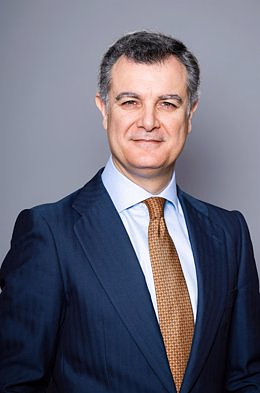Sánchez believes that in developed economies there must be "high salaries" to "support social investment"
BILBAO, 19 Sep. (EUROPA PRESS) -
The president of PwC, Gonzalo Sánchez, does not foresee "very strong" economic growth in the coming years and believes that inflation will drop somewhat, but will remain around 4% for a "long time".
Sánchez has held these demonstrations in Bilbao, where he has attended the inauguration of the international entrepreneurship center B Accelerator Tower (BAT), promoted by the Provincial Council of Bizkaia and the Bilbao City Council and which will be operated by PwC in alliance with Talent Garden and Impact Hub.
At the opening ceremony, he stated that it is at a time when it seems that "the most important thing is whether to enter a recession or not or whether it grows or decreases by 1%" when, in his opinion, that is not is what is important, but to prepare for an economic model that is changing.
"We are going to face a model with inflation that will go down -- there will not be inflation of 9%, but there will be constant inflation around 4% for a long time -- with interest rates that are on the rise and They will probably continue to rise in the coming months and we will never see interest rates like those of the past," he said.
Along with this, regarding growth, he has anticipated that there will be "peaks", but foresees that "it will not be a very strong growth in the coming years". "We are going to have to play with high inflation, interest rates probably below inflation and low growth. We have to prepare to navigate that storm and it will not be easy," he added.
Sánchez has also affirmed that developed economies are those that are identified with "high" levels of well-being, per capita income, infrastructure and technological progress, implying "necessarily achieving, among other things, high wages to support social investment."
This model requires production with added value in order to set "appropriate prices" and transfer the casuistry of costs to the market and also have "high productivity" in order to sustain "margins and social investment".
As indicated, this need is even more evident in an environment like the current one with "higher energy costs, with a higher price of all consumption due to inflation and with higher personnel costs due to the lack of human capital".
In relation to ways to improve productivity, he has indicated that there is consensus on two key elements, which are technology and innovation. In this sense, he has indicated that Europe continues to be a world economic power but its business activity has lost weight compared to economies such as the United States or China.
Specifically, the weight of the European economies in global capitalization and profits has been halved in the last two decades and Europe has suffered a slowdown in its productivity growth and is 14.5% lower than that of the United States. Joined.
"But the truth is that we have all the necessary capacity so that these figures are not like that, we achieve more with less and in fact the income generated in the State by innovative products exceeds 15% of the total income of companies while the average Europe is around 13%, so it is not a problem of return on investment and we also know that it is possible to achieve improvements in productivity with realistic levers such as investment in technology," he added.
Sánchez has indicated that it is estimated that 1% growth in productivity can be achieved just by exploiting digital opportunities with technologies such as artificial intelligence, blockchain or high-performance computing.

 Exploring Cardano: Inner Workings and Advantages of this Cryptocurrency
Exploring Cardano: Inner Workings and Advantages of this Cryptocurrency Seville.- Economy.- Innova.- STSA inaugurates its new painting and sealing hangar in San Pablo, for 18 million
Seville.- Economy.- Innova.- STSA inaugurates its new painting and sealing hangar in San Pablo, for 18 million Innova.- More than 300 volunteers join the Andalucía Compromiso Digital network in one month to facilitate access to ICT
Innova.- More than 300 volunteers join the Andalucía Compromiso Digital network in one month to facilitate access to ICT Innova.-AMP.- Ayesa acquires 51% of Sadiel, which will create new technological engineering products and expand markets
Innova.-AMP.- Ayesa acquires 51% of Sadiel, which will create new technological engineering products and expand markets The Prosecutor's Office requests that the AN investigate the detainee for terrorism for damaging an ax in a McDonalds in Badalona
The Prosecutor's Office requests that the AN investigate the detainee for terrorism for damaging an ax in a McDonalds in Badalona Balearic PSOE denounces the director of IbSalut for prevarication for renouncing the mask claim file
Balearic PSOE denounces the director of IbSalut for prevarication for renouncing the mask claim file Otxandiano reproaches that PSOE "has lent itself" to taking out ETA in the campaign, like the extreme right against Sánchez
Otxandiano reproaches that PSOE "has lent itself" to taking out ETA in the campaign, like the extreme right against Sánchez Puigdemont claims to have a "well grasp" of the State and asks to "be respected" to obtain more transfers
Puigdemont claims to have a "well grasp" of the State and asks to "be respected" to obtain more transfers How Blockchain in being used to shape the future
How Blockchain in being used to shape the future Not just BTC and ETH: Here Are Some More Interesting Coins Worth Focusing on
Not just BTC and ETH: Here Are Some More Interesting Coins Worth Focusing on Valencia displays its "innovative and technological potential" at the Emerge Americas event in Miami
Valencia displays its "innovative and technological potential" at the Emerge Americas event in Miami The CSIC incorporates the challenges of robotics, nanotechnology and AI in the new strategic plan for biomedicine
The CSIC incorporates the challenges of robotics, nanotechnology and AI in the new strategic plan for biomedicine Innovation allocates 9.1 million to train 74,000 people and guarantee digital inclusion
Innovation allocates 9.1 million to train 74,000 people and guarantee digital inclusion LIFE SPOT manages to develop new green treatments that eliminate groundwater contamination
LIFE SPOT manages to develop new green treatments that eliminate groundwater contamination A million people demonstrate in France against Macron's pension reform
A million people demonstrate in France against Macron's pension reform Russia launches several missiles against "critical infrastructure" in the city of Zaporizhia
Russia launches several missiles against "critical infrastructure" in the city of Zaporizhia A "procession" remembers the dead of the Calabria shipwreck as bodies continue to wash up on the shore
A "procession" remembers the dead of the Calabria shipwreck as bodies continue to wash up on the shore Prison sentences handed down for three prominent Hong Kong pro-democracy activists
Prison sentences handed down for three prominent Hong Kong pro-democracy activists ETH continues to leave trading platforms, Ethereum balance on exchanges lowest in 3 years
ETH continues to leave trading platforms, Ethereum balance on exchanges lowest in 3 years Investors invest $450 million in Consensys, Ethereum incubator now valued at $7 billion
Investors invest $450 million in Consensys, Ethereum incubator now valued at $7 billion Alchemy Integrates Ethereum L2 Product Starknet to Enhance Web3 Scalability at a Price 100x Lower Than L1 Fees
Alchemy Integrates Ethereum L2 Product Starknet to Enhance Web3 Scalability at a Price 100x Lower Than L1 Fees Mining Report: Bitcoin's Electricity Consumption Declines by 25% in Q1 2022
Mining Report: Bitcoin's Electricity Consumption Declines by 25% in Q1 2022 Oil-to-Bitcoin Mining Firm Crusoe Energy Systems Raised $505 Million
Oil-to-Bitcoin Mining Firm Crusoe Energy Systems Raised $505 Million Microbt reveals the latest Bitcoin mining rigs -- Machines produce up to 126 TH/s with custom 5nm chip design
Microbt reveals the latest Bitcoin mining rigs -- Machines produce up to 126 TH/s with custom 5nm chip design Bitcoin's Mining Difficulty Hits a Lifetime High, With More Than 90% of BTC Supply Issued
Bitcoin's Mining Difficulty Hits a Lifetime High, With More Than 90% of BTC Supply Issued The Biggest Movers are Near, EOS, and RUNE during Friday's Selloff
The Biggest Movers are Near, EOS, and RUNE during Friday's Selloff Global Markets Spooked by a Hawkish Fed and Covid, Stocks and Crypto Gain After Musk Buys Twitter
Global Markets Spooked by a Hawkish Fed and Covid, Stocks and Crypto Gain After Musk Buys Twitter Bitso to offset carbon emissions from the Trading Platform's ERC20, ETH, and BTC Transactions
Bitso to offset carbon emissions from the Trading Platform's ERC20, ETH, and BTC Transactions Draftkings Announces 2022 College Hoops NFT Selection for March Madness
Draftkings Announces 2022 College Hoops NFT Selection for March Madness


























